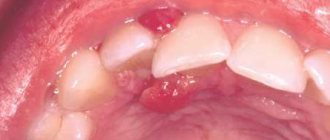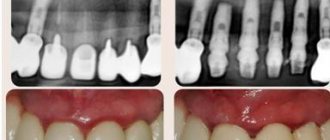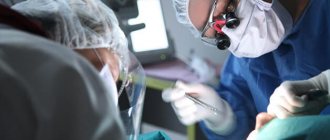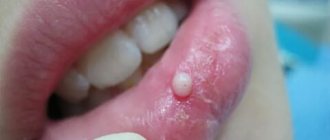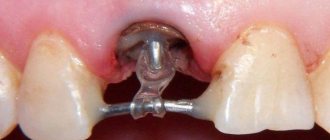Mucositis and peri-implantitis are periodontal diseases in the area of dental implants. In their manifestations, these diseases are very similar to periodontal diseases in the dental area, such as gingivitis and periodontitis, which is clearly visible in the illustrations above, but, due to the structural features of the soft tissues around the implant, mucositis and peri-implantitis differ from gingivitis and periodontitis in the nature of the course of the disease, therefore, a different treatment tactic is chosen.
Mucositis is inflammation of the mucous membrane in the area of a dental implant without signs of bone loss (clinical signs similar to gingivitis).
| Gingivitis | Mucositis |
Peri-implantitis is an inflammatory disease of soft tissue in the implant area, accompanied by bone resorption (loss) (clinical signs similar to periodontitis).
| Periodontitis | Peri-implantitis |
The disease is determined during a follow-up examination at the dentist using probing of the gum pockets and x-rays.
Features of peri-implantitis
The course of the inflammatory process with peri-implantitis is more severe. The peculiarity of peri-implantitis is that the area of inflammation is not separated from the bone by a zone of connective tissue, as in periodontitis (as can be seen in the figure above), but is in contact with the bone. In periodontitis, the gum pocket has a layer that separates it from the bone, so the bone tissue is separated from microbes. With peri-implantitis there is no such layer. The degree of bone resorption (bone loss) can be assessed using a control x-ray taken after the installation of dentures.
How to avoid problems with implant healing?
As you can see, there are many reasons why the implant installation process can cause complications. Unfortunately, there is no way to 100% protect yourself from additional problems after an implantation procedure, but you can minimize the risk of complications by adhering to the following recommendations.
- Do not refuse additional examination (tests for allergic reactions, additional x-rays, etc.) before surgery: it can reveal diseases that can cause complications.
- Follow all instructions and recommendations of your attending physician for the postoperative period. Do not interrupt the prescribed course of medication.
- Contact your doctor immediately if you experience any unusual symptoms after surgery. Even if the symptoms turn out to be normal for the healing process of wounds at the implantation site, it is better to double-check this than to miss the onset of rejection.
- Be careful about oral and dental hygiene.
And, perhaps, the very first and most important thing is to choose the right clinic. The high professionalism of doctors, their attentiveness to patients and advanced technologies guarantee that the risk of complications will be almost zero.
In professional clinics such as VivaDent, before any operation, including implant installation, a detailed treatment plan is always drawn up. The plan is discussed with the patient, and when drawing it up, all the characteristics of the body are taken into account. Information about the patient’s various diseases (including allergies), both obtained during the survey and during additional examination, is always taken into account by professional doctors when planning treatment.
Carefully study the information on clinic websites, as well as reviews about them on the Internet, before agreeing to implantation. After all, only a truly professional approach can guarantee maximum protection against possible complications.
Treatment of peri-implantitis
If you have dental implants installed and there are signs of gum inflammation, do not use traditional treatment methods or advice from friends. Contact a specialist for advice. Treatment of peri-implantitis should be aimed, first of all, at eliminating the infectious process in the tissues around the implant, closing the gum pocket, stopping bleeding and preventing further bone loss. If necessary, the bone level is restored using bone grafting.
The first stage of treatment for reimplantitis is professional hygiene, during which soft and hard dental plaque is removed from the implant, dentures and teeth. Ultrasonic cleaning devices are used to remove subgingival plaque, which do not damage the implant, abutment, crowns and surrounding tissue.
When treating re-implantitis, surgical intervention may be required - opening the gum area in the area of the implant, which gives the doctor the opportunity to see the surface of the implant for more thorough cleaning, as well as bone grafting in case of bone resorption (loss).
Family Dentistry has experienced periodontists who can help with periodontal disease. Treatment is carried out using the most advanced methods using modern equipment. Periodontist surgeon I.I. Yakimenko uses a dental laser, which makes surgery painless and bloodless. Periodontist Kolesnikova N.A. uses a dental laser to sterilize periodontal pockets and speed up tissue restoration. Our doctors’ extensive experience of successful work helps us cope with any, even very complex cases.
When should you see a doctor?
The appearance of a fistula from which pus comes out is a sign of an advanced inflammatory process. To save the implant, you need to see a doctor much earlier. The first signs of inflammation may be:
- the appearance of a lump or swelling on the gum,
- redness of the oral mucosa,
- pain that intensifies when chewing and pressing on the tooth, eating hot and cold food,
- bleeding gums,
- mobility of the installed crown,
- fever, general deterioration of health.
Prevention of peri-implantitis and mucositis
To prevent periodontal diseases after treatment for reimplantitis or mucositis, it is necessary to continue careful hygiene, using products selected by the hygienist and following the rules of self-hygiene after dental implantation, not skip check-ups with the dentist and undergo professional cleaning of teeth, dental implants and dentures according to the schedule prescribed by the doctor.
Other related articles:
- Features of the tissues around the dental implant
- Observation by a doctor after dental implantation
- Self-hygiene after dental implantation
- Professional hygiene after dental implantation
Make an appointment with periodontists, hygienists, for professional teeth cleaning or dentures by calling +7-499-110-18-04 or through the form on the website. You can ask questions to the chief physician of the clinic, Sergei Vladimirovich Tsukor, on his page on
How to treat a complication
Treatment of peri-implantitis depends on the stage of development of the disease. Reduces to the following procedures:
- surgical removal of the sac containing pus;
- cleaning and removing the gum pocket;
- treating gums with antiseptics;
- removal of tartar and soft plaque formed on the crown using ultrasound, which also has a detrimental effect on pathogenic bacteria;
- if necessary, clean and disinfect the dental structure using a special device;
- the patient is recommended to actively rinse the mouth with antibacterial solutions and infusions of medicinal herbs.
When acute tissue destruction is diagnosed, after removing the lump with pus, the jaw bone and normal microflora of the oral cavity are restored. Thus, without removing the implant, it is possible to perform an operation to replant shavings from artificial bone or donor natural material. After surgery, the wound is covered with stitches and a bandage. The patient is prescribed the use of Diplen-dent film, Metrogil-dent gel, and Solcoseryl dental adhesive paste.
To restore the tissues affected around the titanium root and speed up the process of relieving inflammation, physiotherapeutic procedures are carried out. Laser treatment is especially effective. Antibiotics are also prescribed.
If the inflammatory process and suppuration recur, the only way out is to remove the implant. Removal of the dental structure is also resorted to in the event of the development of the process of its rejection.
Sign up for dental implantation at a discount:
— What can cause a breakdown?
Injury. For example, a person can fall off a bicycle and injure a tooth. Sometimes patients come for an appointment and say that their crown has become mobile. This may be a sign that a screw has become loose or broken. If everything is fixed, then a crack may have formed.
— Is it possible to replace the neck of the implant?
No, the neck is part of the implant. Recently a patient came to me whose screw had broken. Upon inspection, I saw that, indeed, a piece of the screw was broken. We tried to help him restore the system. There are special microtools that allow you to carry out various manipulations. Unfortunately, nothing worked for us, the screw jammed, and the implant had to be removed, since the crown cannot be fixed without a screw. After some time, we will install a new implant for this patient.
— Regarding the process and timing of implant installation. If a native but diseased tooth is removed, is it possible to perform an implantation operation with an artificial tooth on the same day? And if an artificial tooth - an implant - is removed, then time must pass before re-implantation can be carried out. This is true?
If we are talking about replacing an implant, then time must pass. Often it is necessary to prepare the bone with a trephine or a milling cutter. The bone is baked, in addition, it can be infected. There must be a period of recovery and regeneration before a new implant is placed.
If we say that the patient’s tooth was removed without complications, the socket is not damaged, there is no infection, then there are no obstacles to immediate implantation.
— What if the tooth extraction was difficult? For example, a tooth had thin walls and a large filling; it broke when removed.
In this case, immediate implantation is questionable. First, using special tools, we divide the tooth into small fragments and carefully remove them. After the procedure, it is necessary to allow the body to recover. On average, this will take from three to six months.
— How many years can an implant last?
It's different for everyone. Every time patients with already installed systems come to see me, I ask where and how long ago they were installed. For example, I had a client who had an implant installed 32 years ago in Germany.
— It turns out that implants began to be placed abroad much earlier than in Russia?
Yes, for certain reasons, mainly of a political nature, dental implantation began much later in our country. On average, dental implants last about ten to twelve years. These are average statistics!!!
— What happens when the life of the implant comes to an end?
It is difficult to talk about the service life of an implant in the human body. The patient may get injured or get sick. When sick, a person's immune system weakens. If local periodontitis is observed, then due to low immunity it can develop into an acute form. Caries should not be allowed to occur. You should take good care of your teeth.
It is important to understand
that the metal root itself is not as susceptible to external factors as the tissues that surround it. In fact, it can only break mechanically. The only difference between a regular tooth and an implant is that the tooth has a natural layer around the root called the periodontium. It performs the functions of nutrition, protection and shock absorption. When chewing, teeth absorb shock. The implant does not have this ability; bone grows into it, and it stands rigidly. In the literature, some doctors claim that during implantation there is a slight effect of fibro-osseointegration, which ensures slight mobility of the implant. I don’t believe this, the implant is not fed, it just sits rigidly in the bone and is a foreign material.
— Does the complexity of implantation depend on the location of the teeth?
Yes. An experienced implantologist takes into account, first of all, the work being carried out: the alveolar ridge of the jaws, the anatomy, structure and density of the bone. Everything is individual, in its own complexity.
Clinical case. Dental implantation in the upper jaw, closed sinus lift
— What mandatory recommendations for caring for implants do you give to your patients?
Good oral hygiene is necessary - this includes an irrigator and thorough brushing. In some cases, dental floss can be used. Under no circumstances should a brush be used to clean a dental implant. The brush injures the periodontal papilla. This negatively affects the condition of the gums and teeth. Food debris gets into the resulting spaces and bacteria multiply. Toothpicks have the same effect.
— They write on the forums that once every six months you must come to an appointment with your implantologist and take a photo. In this case, the crown is screwed together and certain manipulations are carried out with the implant. This is true?
Yes, visiting a doctor once every six months is mandatory. There is no need to screw the crown. This is done if necessary, or if there is a conditionally removable structure. The doctor can remove the prosthesis and perform examination and hygiene procedures. In practice this is not always achieved. Basically, a control X-ray is taken to see if there is any loss of marginal bone, and professional oral hygiene is carried out.
— And if there is a loss, what needs to be done in this case?
Attrition is allowed. There cannot be a clear answer to this question, since each specific case is examined by a doctor. He makes the final decision on further actions.
Thanks for the informative story!
Early complications after implant installation
The success of any implantation depends on many factors, which cannot be taken into account. These include the individual characteristics of the body, the reaction to intervention, the presence of contraindications and compliance with recommendations. Yes, modern implants have a high survival rate, up to 99%
, but there is always that 1% that will cause complications. It could be:
Early peri-implantitis
This is an inflammation of the tissues adjacent to the implant. This leads to a pocket forming between the pin and the bone and tissue loss.
During the operation, the outer coverings of the oral cavity, which protect the body from infections, are damaged. Bacteria can enter a poorly treated wound. The same thing happens if oral hygiene is insufficient after surgery. Inflammation can be caused by overheating of tissues during implantation.
In the initial stages, peri-implantitis is treatable. In advanced cases, the pin is removed.
Implant rejection
A few days after implantation, the patient notices mobility of the pin, which increases. The gums turn red and swell. Possible fistula formation. The x-ray shows that the bone is being destroyed. This causes mobility of the implant. It will have to be removed. Rejection is caused by bacteria that provoke purulent inflammation of the bone, or overheating of the bone during surgery.
What can happen during surgery
No matter how expensive and high-quality implants are, complications during surgery depend on the qualifications of the implantologist. This is why choosing a doctor is so important. Experienced doctors practically never have misfires in the form of:
- Bleeding
due to vessel damage
Bleeding may be associated with increased blood pressure and poor blood clotting. However, in the vast majority of cases, vessel rupture occurs due to surgeon error.
- Perforation of the maxillary sinus
In the upper jaw there is little bone for installation; it often has to be replanted (sinus lift). When implanting upper teeth, it is easy for the doctor to make a mistake and drill a hole that is too deep. 3D modeling and surgical guides, coupled with the surgeon's experience, significantly reduce such cases.
- Nerve injury
When working on the lower jaw, there is a possibility of touching the alveolar, mental or lingual nerve. This leads to numbness. This is why implantologists insist on performing a CT scan before surgery, this helps to make accurate measurements in the area where the pin is being implanted.
Alveolar wall
The result of an incorrectly selected implant size.
Modern technologies: 3D modeling, surgical templates, CT and orthopantomogram virtually eliminate operational errors.
